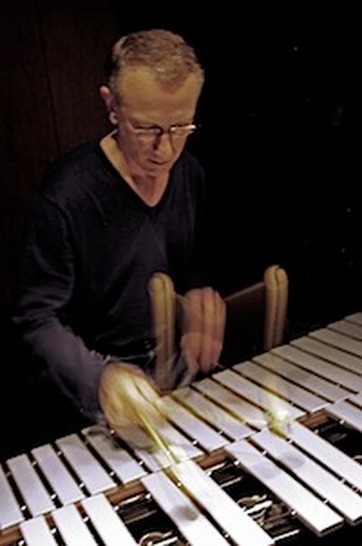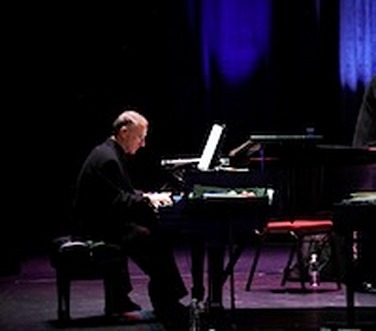Miniature Orchestra returns
Berkshire Eagle, 5/6/11

By Jeremy D. Goodwin
PITTSFIELD—Larry Chernicoff is hosting a reunion.
The composer, bandleader, and vibraphone player—by day an eclectically talented marketing entrepreneur based out of Great Barrington—is convening his Miniature Orchestra on Saturday for its first show in five years. The performance, at Barrington Stage Company's main stage, will feature a seven-member band largely culled from jazz pros with whom Chernicoff has collaborated, on and off, for years.
Though their frequency has decreased over the years, Chernicoff’s periodic summits of skilled musicians from around the Northeast have long been considered delicacies to savor, by those in the know.
His music is most easily filed under the big tent of jazz, though the instrumentation (including violin, cello, and woodwind instruments including oboe and various saxophones) reminds of European classical music. And though the musicians will execute Chernicoff's meticulously arranged compositions, the composer has deliberately built in some room for jazzy improvisation.
"There's so much cross fertilization now that it's really hard to define what jazz is anymore. There's just no end to the variety that we think of under the umbrella of jazz," he says in a telephone interview from his home office, taking a break from a furious spree of composing and arranging in the last days before the performance. "I have extremely wide musical tastes. I think that in music, like in life, it is better to learn to appreciate more things than to define yourself by the things you don't like."
Larry Chernicoff's Miniature Orchestra will feature some brand new compositions as well as pieces that its namesake has been playing and refining for decades. He first cut his teeth in the free jazz scene of the early 1970's, studying with the well-known German pianist and vibist Karl Berger at New York's New School. Chernicoff traveled through Europe, playing with greats like trumpeter Don Cherry before winding up as a student, teacher and employee of the Creative Music Studio in Woodstock, co-founded by Berger and Ornette Coleman, who literally named the genre free jazz.
PITTSFIELD—Larry Chernicoff is hosting a reunion.
The composer, bandleader, and vibraphone player—by day an eclectically talented marketing entrepreneur based out of Great Barrington—is convening his Miniature Orchestra on Saturday for its first show in five years. The performance, at Barrington Stage Company's main stage, will feature a seven-member band largely culled from jazz pros with whom Chernicoff has collaborated, on and off, for years.
Though their frequency has decreased over the years, Chernicoff’s periodic summits of skilled musicians from around the Northeast have long been considered delicacies to savor, by those in the know.
His music is most easily filed under the big tent of jazz, though the instrumentation (including violin, cello, and woodwind instruments including oboe and various saxophones) reminds of European classical music. And though the musicians will execute Chernicoff's meticulously arranged compositions, the composer has deliberately built in some room for jazzy improvisation.
"There's so much cross fertilization now that it's really hard to define what jazz is anymore. There's just no end to the variety that we think of under the umbrella of jazz," he says in a telephone interview from his home office, taking a break from a furious spree of composing and arranging in the last days before the performance. "I have extremely wide musical tastes. I think that in music, like in life, it is better to learn to appreciate more things than to define yourself by the things you don't like."
Larry Chernicoff's Miniature Orchestra will feature some brand new compositions as well as pieces that its namesake has been playing and refining for decades. He first cut his teeth in the free jazz scene of the early 1970's, studying with the well-known German pianist and vibist Karl Berger at New York's New School. Chernicoff traveled through Europe, playing with greats like trumpeter Don Cherry before winding up as a student, teacher and employee of the Creative Music Studio in Woodstock, co-founded by Berger and Ornette Coleman, who literally named the genre free jazz.

His compositional approach, however, grew to favor more carefully constructed musical passages, and he's forged, through periodic gigs, projects and albums, a fusion of jazz and classical flavors—with a very ecumenical approach toward musical influences.
"We live in an age that's unprecedented in that we can listen to music from anywhere in the world from the last few hundred years, anytime we want to. That's a situation that never existed for musicians before," he reflects. "If I put my iPod on shuffle I can listen to Gregorian chants and the next thing that will come up might be Cyndi Lauper. I love them both, equally. This is the environment that we've all grown up in. It's like a big supermarket of music and we have this amazing opportunity."
Chernicoff also hosts a wide-ranging radio show on Great Barrington’s WBCR-LP. Whether seen in radio playlists that work their way from Yo Yo Ma to Sam Cooke, or an interview in which he freely quotes Duke Ellington, John Lennon and Clint Eastwood, his appetite for artistic stimulation seems open-ended.
His curiosity about the roots of music led him to research the oldest fragments of melody that musicologists and historians have uncovered. One Chernicoff composition, “Hexagram 57,” dating back to his first album in the early 1980’s, incorporates reconstructed bits of musical passages harkening from places like ancient Greece and Sumer.
“No one knows exactly what they sounded like at the time, but you can take the notation and work with it,” he says. “When you listen to [my song], you'd never know that a certain melody the saxophone is playing was written three thousand years ago in Egypt. But it was.”
To this day, “Hexagram 57” continues to receive additions and refinements, Chernicoff reports.
One musician who appeared on that first album is woodwind player Tim Moran, who will renew a long-enduring collaboration when he plays with the ensemble this weekend. Another familiar fellow traveler is Charles Pillow, an in-demand session ace specializing in oboe and English horn who Chernicoff calls “the cream of the crop of New York players.” (Pillow has recorded with artists spanning from Frank Sinatra to Luther Vandross.)
Things are kept fresh with some newer collaborators as well. When the Miniature Orchestra’s longtime percussionist proved unable to make the gig, Pillow recommended Brazilian master Rogerio Boccatto. Another musical comrade more recently added to the group is the bandleader’s daughter Lydia Chernicoff, a graduate student pursuing an advanced degree in violin who’s already built an impressive resume, including one prior engagement with her father’s ensemble.
Though he will alternate between vibraphone and piano, Chernicoff says the ensemble is less about showing off his instrumental technique as it is about creating a setting where great musicians can excel.
“I see myself as a composer who happens to play a couple of instruments,” he says. “These concerts are about my compositions rather than me as a player. And I'm absolutely very lucky to have these fabulous players with me.”
"We live in an age that's unprecedented in that we can listen to music from anywhere in the world from the last few hundred years, anytime we want to. That's a situation that never existed for musicians before," he reflects. "If I put my iPod on shuffle I can listen to Gregorian chants and the next thing that will come up might be Cyndi Lauper. I love them both, equally. This is the environment that we've all grown up in. It's like a big supermarket of music and we have this amazing opportunity."
Chernicoff also hosts a wide-ranging radio show on Great Barrington’s WBCR-LP. Whether seen in radio playlists that work their way from Yo Yo Ma to Sam Cooke, or an interview in which he freely quotes Duke Ellington, John Lennon and Clint Eastwood, his appetite for artistic stimulation seems open-ended.
His curiosity about the roots of music led him to research the oldest fragments of melody that musicologists and historians have uncovered. One Chernicoff composition, “Hexagram 57,” dating back to his first album in the early 1980’s, incorporates reconstructed bits of musical passages harkening from places like ancient Greece and Sumer.
“No one knows exactly what they sounded like at the time, but you can take the notation and work with it,” he says. “When you listen to [my song], you'd never know that a certain melody the saxophone is playing was written three thousand years ago in Egypt. But it was.”
To this day, “Hexagram 57” continues to receive additions and refinements, Chernicoff reports.
One musician who appeared on that first album is woodwind player Tim Moran, who will renew a long-enduring collaboration when he plays with the ensemble this weekend. Another familiar fellow traveler is Charles Pillow, an in-demand session ace specializing in oboe and English horn who Chernicoff calls “the cream of the crop of New York players.” (Pillow has recorded with artists spanning from Frank Sinatra to Luther Vandross.)
Things are kept fresh with some newer collaborators as well. When the Miniature Orchestra’s longtime percussionist proved unable to make the gig, Pillow recommended Brazilian master Rogerio Boccatto. Another musical comrade more recently added to the group is the bandleader’s daughter Lydia Chernicoff, a graduate student pursuing an advanced degree in violin who’s already built an impressive resume, including one prior engagement with her father’s ensemble.
Though he will alternate between vibraphone and piano, Chernicoff says the ensemble is less about showing off his instrumental technique as it is about creating a setting where great musicians can excel.
“I see myself as a composer who happens to play a couple of instruments,” he says. “These concerts are about my compositions rather than me as a player. And I'm absolutely very lucky to have these fabulous players with me.”
